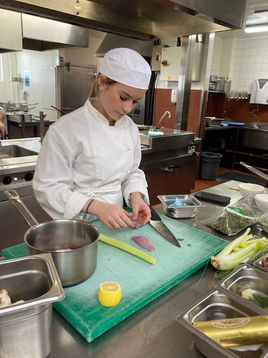HOME ECONOMICS

Staff Members
-
A. Emerson - Principal Teacher of Home Economics
-
K. Telfer - Teacher of Home Economics
-
J. Donaghy - Teacher of Home Economics
Introduction
Home Economics teaches pupils about food, good nutrition, and the foundations of a healthy and successful life.
Pupils are taught a range of practical skills through practical cookery lessons and cover a variety of domestic topics from budgeting to health and nutrition. These skills allow pupils to make more informed decisions about what they eat, and lifestyle choices, while appreciating how these impact on both mental and physical health.
Home Economics gives young people skills and practical knowledge that will stay with them for life. It also opens doors to a range of potential careers and interests from hospitality to health and nutrition.
Belmont Home Economics Department aims:
-
To provide pupils with practical life skills to produce a range of healthy foods and prepare pupils for independent living.
-
To make pupils aware of health, nutrition and lifestyle choices, offering practical cookery lessons to support this as well as theory lessons to consolidate their learning.
-
To give pupils an awareness of consumer issues, to enable them to become responsible citizens.
-
To inform pupils of a range of career pathways linked to Home Economics and work with partners to help make learning relevant.
Home economics has important links to a number of career routes:
-
Hospitality industry
-
Dietitian/health care
-
Education
-
Childcare
-
Food Manufacturing
-
Product Development
BGE Home Economics
S1
In S1 we cover basic cookery skills, such as hygiene & safety, weighing & measuring, using the cooker, reading a recipe, cookery processes and techniques.
S2
In S2 we look at the Scottish dietary goals, nutrients and sustainability, while continuing to develop pupil’s cookery skills.
S3
In S3 pupils complete the REHIS (Royal Environmental Health Institute Scotland) Elementary Food Hygiene certificate as well as advancing their practical cookery skills and processes. We also cover Sustainability and investigate the benefits of using local and seasonal foods.
National 5 Practical Cookery
This course aims to further develop candidates’ life skills and enhance their personal effectiveness in terms of cookery and to provide a set of skills for those who wish to progress to further study in the hospitality context. In preparing candidates for life, the course anticipates their future needs and enables them to learn how to plan, prepare and cook food for themselves and others. It also develops organisational skills, which have an application in a wide variety of contexts.
The course aims to enable candidates to:
-
Proficiently use a range of cookery skills, food preparation techniques and cookery processes when following recipes
-
Select and use ingredients to produce and garnish or decorate dishes
-
Develop an understanding of the characteristics of ingredients and an awareness of their sustainability
-
Develop an understanding of current dietary advice relating to the use of ingredients
-
Plan and produce meals and present them appropriately
-
Calculating and budgeting for costs of ingredients and recipes
-
Work safely and hygienically
Supported Study / Clubs
The department takes part in the Future chefs’ competition, previous pupils have progressed to the local and regional finals, this requires pupils to attend at lunchtimes and after schools to prepare and practise their dishes.
We also support Duke of Edinburgh pupils by assessing their cookery skills.
The department offers after school supported study to senior pupils prior to prelim and final exams to support with additional tuition in preparation for the various aspects of the course.















